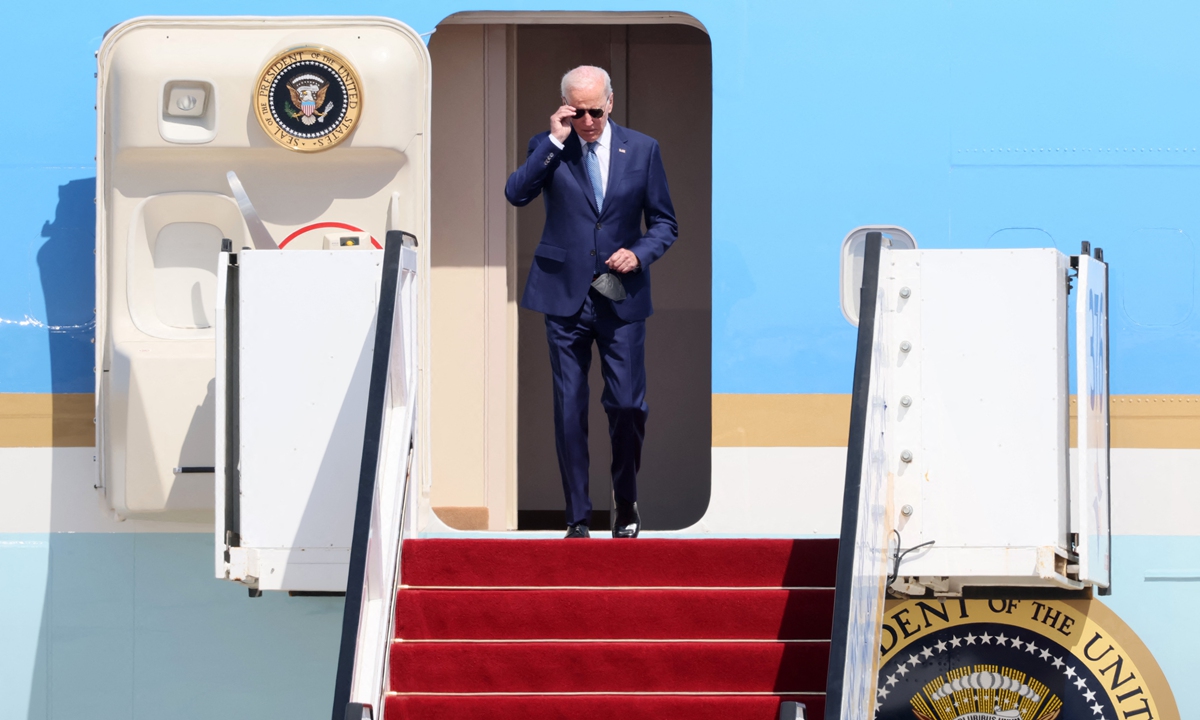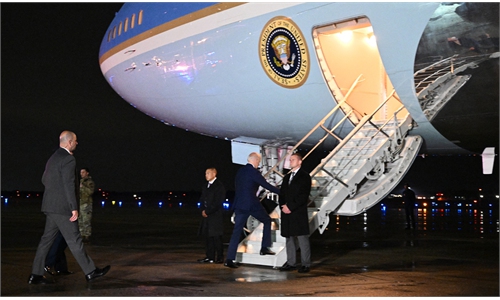Biden’s Mideast trip would find ‘dilemma between confronting Iran and sanctioning Russia’

US President Joe Biden disembarks from his plane upon landing at Ben Gurion Airport in Lod near Tel Aviv, on July 13, 2022. Photo: AFP
US President Joe Biden arrived in Tel Aviv on Wednesday, kicking off his trip to the Middle East as observers expect that the US could launch a "Middle East NATO" to counter Iran and to convince Gulf states to increase global oil supplies to ease the energy crisis caused by the Ukraine crisis and the Western sanctions against Russia.
Chinese analysts said Biden would find a dilemma between these two goals, and with the declining US influence in the region, the US is unlikely to be able to form a new military alliance with significant power.
After the Ukraine crisis, the US is trying to make NATO more globalized or copy the model of such a military alliance in other regions like the Asia-Pacific and the Middle East, using disputes or divergences among regional countries to intensify bloc-to-bloc confrontations as has already happened in Europe, said analysts. The US attempt is unlikely to be realized due to the complicated regional situation, they said.
Qiu Wenping, an expert on Middle East studies and a Fudan University professor, told the Global Times on Wednesday that the US is pulling out from the Middle East as its hegemony is declining.
"This time Biden is trying to make a big plan to pacify concerns among its regional allies as they worry the US pullout could bring new uncertainties," Qiu said.
The plan mainly aims to form an anti-Iran alliance with cooperation between Saudi Arabia-led Gulf states and Israel, and also contain the expansion of Turkey in the region, as well as stopping regional countries from cooperating with Russia and China, Qiu noted.
However, such a plan would be extremely difficult, said analysts. The relationship between Israel and Saudi Arabia is shaky, because it is impossible for the US to totally change the hostile ties between Israel and Islamic world.
"So even if Saudi Arabia really wants to reinforce ties with the US, it dares not align with Israel," Qiu said. She noted that if the US does not increase troop numbers in the region, the possibility of more chaos in the region would be bigger than the establishment of a new military alliance.
According to an article published by the National Interest on Saturday, the Abraham Accords, a joint statement pushed by the Trump administration to normalize ties between Israel and Arab countries, made it easier for Israel and Arab countries to coordinate militarily, notably to create a regional air defense alliance ― the Middle East Air Defense Alliance (MEAD) - to counter "threats from Iran."
But Politico quoted experts and officials as saying that "continued mistrust and technological differences" mean this kind of idea could be years away. For instance, one problem is that Saudi Arabia and the UAE also operate Chinese and Russian systems, which cannot integrate with Western equipment, Politico reported, quoting experts.
"Middle Eastern countries are very sensitive to the weakening US power in the region," Qui said, because "they have seen what Ukraine has experienced in the confrontation between NATO and Russia, so it would be very difficult for the US to use them to confront Iran and Russia in the regions."
But it is possible for regional countries, especially Saudi Arabia, to use the US intention of forming a "Middle East NATO" to bargain for something else, including to totally get rid of the impact on US-Saudi Arabia ties caused by the death of journalist Jamal Khashoggi and also to loosen the US' ban on arms sales to Saudi Arabia, experts said.
The US would also find dilemma in building a NATO-like alliance to counter Iran in the region and releasing more oil supplies from the region, analysts said.
The US is facing an energy crisis now due to the Ukraine conflict and it wants Gulf states to increase supplies. However, French President Emmanuel Macron was told by the UAE that "two top OPEC oil producers, Saudi Arabia and the United Arab Emirates, can barely increase oil production," according to Reuters.
This will make the US consider pushing negotiations with Iran on the nuclear deal to make Iran release more oil supplies, but this would offend Israel and Saudi Arabia, and goes against its own plan to build an anti-Iran regional alliance, said experts.
Yin Gang, a research fellow at the Institute of West-Asian and African Studies of the Chinese Academy of Social Sciences, told the Global Times on Wednesday, "After taking office, Biden rejoined the Iran nuclear deal, which had already upset the Gulf countries," and ironically, the energy crisis is making the US go cap in hand to OPEC members, mainly the Gulf countries.
The US now hopes the OPEC members can release enough capacity, and the easing of relations with Iran will be an important part of the process, Yin said. "If the Iran nuclear talks go well and Iran's oil export sanctions are lifted, Iran is expected to be able to release 1.5 million barrels of oil supply per day," Yin remarked.
Cui said the dilemma for the US is whether to remove sanctions against Iran and let Tehran release more oil supplies but risk offending traditional allies like Israel and Saudi Arabia, or to build an anti-Iran alliance, but suffer from the pain of the energy crisis. "There is no perfect plan for the US now," he said.
Russian President Vladimir Putin will also make his move soon to the Middle East to counter Biden's latest actions. According to RT, Putin will visit Tehran on July 19 for talks with his Iranian and Turkish counterparts, Kremlin spokesperson Dmitry Peskov said during a press briefing on Tuesday.
Putin will attend a trilateral meeting with Iranian President Ebrahim Raisi and Turkish President Recep Tayyip Erdogan under the "Astana peace process." The format was launched in early 2017 with the aim of putting an end to the 11-year-long conflict in Syria. "In addition to the trilateral meeting, there will also be bilateral meetings," Peskov said.
The attitude of the Gulf countries and Russia's engagements with Iran will hang a question mark over Biden's oil-hunting trip, observers noted.


